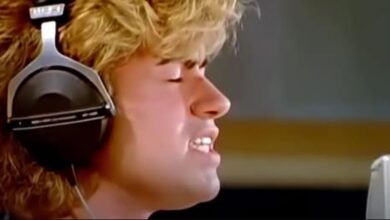This Live Led Zeppelin Performance Proves The Swagger Of Page In His Prime Is Unmatched In Rock History
“**The Ocean**” by Led Zeppelin is a classic rock song released on their 1973 album “Houses of the Holy.” This track stands out as a testament to the band’s creative versatility and musical prowess. It combines elements of hard rock, funk, and doo-wop, showcasing Led Zeppelin’s ability to blend diverse musical styles into a cohesive and compelling piece.
The song begins with a powerful guitar riff from Jimmy Page, which is soon joined by John Bonham’s distinctive drumming. Bonham’s performance on “The Ocean” is particularly noteworthy for its complexity and energy, demonstrating why he remains one of rock’s most revered drummers. The rhythm section is rounded out by John Paul Jones, whose bass lines not only complement Bonham’s drumming but also add depth to the track.
Lyrically, “The Ocean” refers to the band’s fans, who were likened to an ocean because of their vast numbers and overwhelming energy at concerts. The lyrics “Singing to an ocean, I can hear the ocean’s roar” pay homage to this metaphor. The song also reflects the band’s experiences on tour, with mentions of life on the road and the joys of performing live.
Robert Plant’s vocal delivery on “The Ocean” is dynamic and powerful, ranging from soulful crooning to powerful wails. His ability to convey emotion through his voice plays a significant role in the song’s impact. The track concludes with a doo-wop-influenced coda, which adds a playful layer to the otherwise hard-hitting rock song.
The production of “The Ocean” showcases Led Zeppelin’s studio expertise. The song was recorded at Stargroves using the Rolling Stones Mobile Studio, a setup that allowed the band to experiment with different sounds and recording techniques. This mobility in recording contributed to the fresh and energetic feel of the album.
“Houses of the Holy,” the album that features “The Ocean,” marked a shift in Led Zeppelin’s musical direction. It saw the band experimenting more with melodic compositions and production techniques, setting it apart from their earlier, heavier albums. This track fits well within the album’s explorative ethos, contributing to its overall diversity and innovation.
Robert Plant, the lead singer of Led Zeppelin, was born on August 20, 1948, in West Bromwich, Staffordshire, England. Known for his powerful and distinctive voice, Plant is regarded as one of the greatest vocalists in the history of rock music. His career with Led Zeppelin catapulted him into the spotlight, but his musical interests and influences are varied and include blues, folk, and country.
Plant’s journey in music began in the mid-1960s, but it was his partnership with Jimmy Page that would define his career. Together, they formed Led Zeppelin in 1968, along with John Paul Jones and John Bonham. The band’s innovative approach to rock music and their fusion of different genres helped them become one of the most influential bands in music history.
After Led Zeppelin disbanded following Bonham’s death in 1980, Plant pursued a successful solo career. He has released several albums that showcase his ability to blend different musical styles, demonstrating his versatility as an artist. Plant has also collaborated with various musicians, including a notable partnership with bluegrass singer Alison Krauss.
Plant’s work has earned him numerous accolades, including Grammy Awards. His legacy in rock music is not just limited to his vocal talents but also his curiosity and willingness to explore new musical landscapes. His contributions to music continue to influence new generations of musicians and fans alike.





